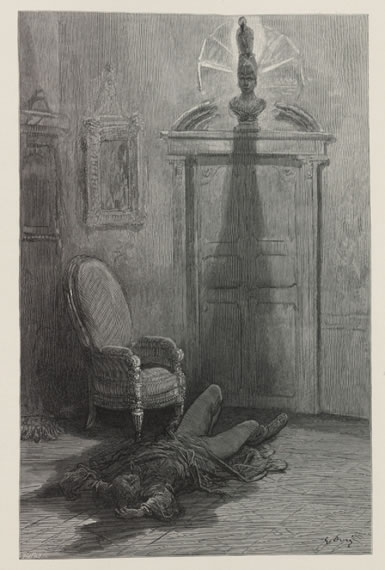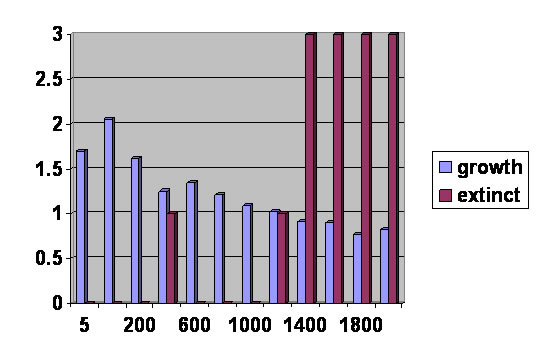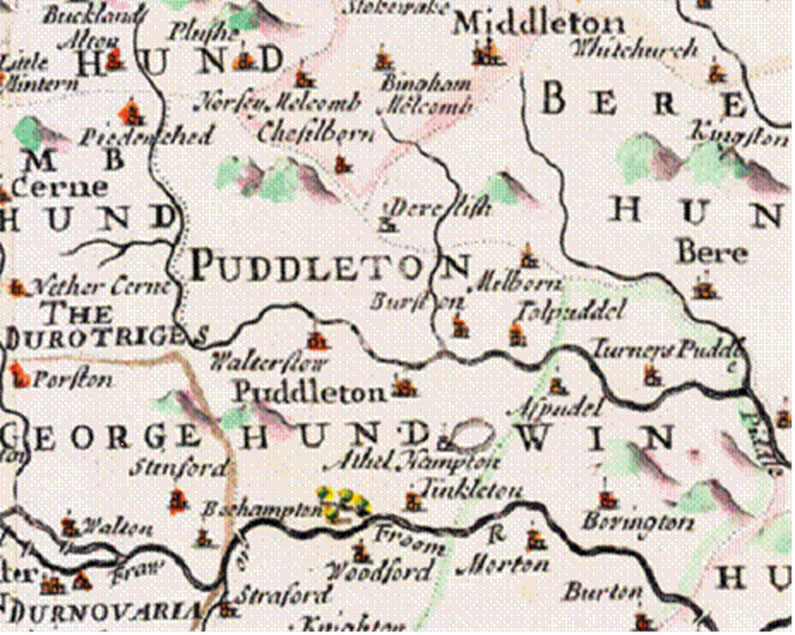
Dore “Raven”
https://hyperallergic.com/102457/rediscovering-the-dark-splendor-of-gustave-dore-with-edgar-allan-poe/ downloaded Feb 18, 2018
Terror 32 Wrap up

Dore “Raven”
https://hyperallergic.com/102457/rediscovering-the-dark-splendor-of-gustave-dore-with-edgar-allan-poe/ downloaded Feb 18, 2018
At this point it may sound like people are a wretched lot. If indeed by marrying for status and not love we are trapped in a pattern like that of mice that leads straight into oblivion, we are doomed, and its our own fault.
But in the first place, it’s hard to believe that the cousin crush, the attraction to appropriate kin is something we are unaffected by. If Japanese quail can sense it, it stands to reason that we can as well. It is probably deeply instilled in us. That’s just an opinion.
In the second place, consider this: since long before we were human we have always been subject to the rule that if a population mates between strangers for more than a few generations, that population is doomed. There is constant selective pressure against tolerance. Yet even today it is possible to talk about peace and tolerance with some people without being ridiculed. Even if ineffective in so many cases, an attraction to peace and love are still at least comprehensible, all in defiance of this particular kind of selection. I think one can conclude that there is goodness in people that endures even such terrible pressure.
We started out long ago talking about inbreeding depression and insisted there had to be a mechanism. But we have been working on the mechanism of outbreeding depression. In fact, the two are one and the same. Consider this graph:

These are 12 simulations done with 10 repeats averaged using a purely post-zygotic mechanism limiting fertility during outbreeding. The vertical axis is the number of populations that went extinct out of the ten (the red bars) and the average number of offspring per individual at generation 1000 (the blue bars). The horizontal axis is the population sizes. Ignore the red bars. They increase at large population sizes. There now should be no surprise here. But if you look at the smallest size tested, there are fewer offspring per couple than at the next larger size. There is your inbreeding depression. If you set up a mechanism limiting fertility in large populations and include a component that is post-zygotic, you will get inbreeding depression, too.
At last inbreeding depression makes sense. Since it is not, as we saw, an automatic consequence of genes, it has to be a superimposed mechanism produced by selection. But if a population is in trouble and has become very small, inbreeding depression is the last thing. It needs. In fact, it is the inescapable byproduct of the absolutely (for complex organisms) necessary presence of outbreeding depression.
More years ago than I can easily believe I did my honors thesis for college on King Arthur. For my purposes, it was only fiction, but as such it has had amazing sustaining power. It was and is easy for me to understand the long-standing popularity of Homer and Shakespeare. Both have intense and intricate dramatic situations, well crafted characters in intense relationships and a polish we ordinary mortals only wish we could create. The Arthur stories pretty much lack all of these things. As I plugged away the thing that distinguished the stories was the quest for the Holy Grail. So I learned something about it.
The historical existence or not was not for me a burning question. Whether Arthur ever lived, he certainly was not around during my college days, but the stories were.
Now after a lifetime I look back and a few things seem plausible. After the Romans left Britain, the culture was dominated by some people known at the time I was writing as the Celts. The meaning of that word has changed, but at they time they were well characterized with a tribal tradition, traditional artwork and languages that tied them in with parts of continental Europe. The domination by the Celts of this highly desirable piece of land was challenged by tribes of Germanic Saxons. Now I say “dominated” because I do not mean to say that I have evidence that they were all “Celtic.” But the elite clearly were.
The Saxons advance. The Celts turn at bay. There is a battle at Badon Hill. The Saxons ran like rabbits. Long afterwards, the Saxons return and took over.
And now you and I share a bit of knowledge neither of us had back in the day. The technology of the time cannot have been much different from that of lower Mesopotamia during most of its history. Mesopotamian civilizations fell because their fertility, or at least the fertility of the elite collapsed. So the ultimate victory is the Saxons is easy to understand; the Celts, their leaders, died out.
Roll forward some six hundred years and a French writer, Chrétien de Troyes , takes up the tale and introduces the Holy Grail. It seems to me that there are about as many theories about what it was as there have been writers commenting on it, but one thing stands out. The Holy Grail had the power to restore people to a land that had lost its people. Cloning was not available at the time, so I shall take a bit of liberty with the tale and say what it could really do was prevent the collapse of a population.
Forgive me if I speculate on history. The Celts were dying out. Some of them sallied forth to see if there was a way to fix it. Had they asked around locally, it would have raised few eyebrows. Anyone could see the problem. But if a few had gone over to France, they would have made quite the impression. “You came here from Britain for what?”
Somehow the legend got tied up with something to do with love. So do not think too low of the Arthur characters and colleagues. They saw there was a problem. They looked for a cure. They suspected it had something to do with mate choice. It would be almost another thousand years before anybody came that close. The Holy Grail? It’s what you are reading or listening to right now.
I have probably waited too long to address this, but there is a line of skeptical thinking one must respect.
Saxon invasion of Britain was halted by the battle of Badon Hill in 516, and the Saxons were held off for “many decades,” (https://www.google.com/search?q=when+was+the+battle+of+badon+hill&oq=when+was+the+battle+of+badon+hi&aqs=chrome.1.69i57j0.10154j1j8&sourceid=chrome&ie=UTF-8) let’s say until the battle of Catraeth in 600.
But the Saxons did not have it all their own way. By the year 800, they were under attack by Vikings, which went on until the Norman Conquest of 1066. So far so good; regimes get into bad trouble within 300 years.
But in 1066 something remarkable began. 1366 came and went without utter disaster. Those who were descended from titled families at that time were not slaughtered – the standard sign of regime change, sufficient if not necessary. In the early 1300’s there were troubles with Scotland, a famine, there were some palace coups so to speak, the hundred-year war began, England won the battle of Crecy; it just does not have the feel of decadence. Jump to the early 1600’s: royal houses of England and Scotland unify but not the parliaments, Jamestown founded, the Civil War defeats the monarchy, but by golly the monarchy comes back. And so goes it forth. The regime change, the real one, certainly not the slaughter of the prior elite, never comes. It’s going on a thousand years. Egypt never broke 700 years. On the face of it, the whole idea that demography brings down regimes within 300 years seems to be in tatters. What gives?
I think the answer can be found in this map (or the map this is part of).

Part of a map of Dorset published in 1695. A “hund” is a hundred “hides” (enough land to support a family) and measures about 6 miles across. From center to edge is about an hour’s walk with a two-way cost of 6 hundred kilocalories. That would be about the limit of a young person’s social horizon. The villages are actually smaller than hunds, but probably not air tight. About a hundred families might make up a social pool. The Domesday Book chronicled thousands of villages shortly after 1066. Essentially all are still there after more than 30 generations.
There is your demographic stability. The government was not centralized; interests were dispersed, and there were always bright capable young men who could be called out of the countryside. Other places were either not so rich in cultural and natural resources or were highly centralized. The has been the usual setup for demographic disaster for the elite.
Among the capable young men from a modest family in a small town was Isaac Newton. Along with his scientific triumphs he wrote a book: Newton’s Revised History of Ancient Kingdoms. I read the Larry and Marion Pierce version published in 2008. You notice at once that he was looking at the same information drawn from history as we were – well maybe not the same, but he did his best as have I. To my reading the 300 year brick wall holds in every case but one, which Newton dismisses. I find it hard to believe that the world’s greatest number cruncher and this sad wreck sitting at a keyboard looked at the same numbers and Newton missed the key observation.
So far as kinship, population size and fertility go, he does not let slip a word. Yet the relationship was immediately obvious to me; if I saw it, he saw it, say I. But he breathed not a word. If he had, civilization would have listened. My experience has been different. Funny old world, eh?
A final objection, which I have meant to lay to rest before, I shall return to. If, as seems the case, marrying outside of moderate circle of kinship is effectively killing babies, this could be taken as an occasion for fear and hatred of strangers and of racism, clinging to ones ethnic group and so forth. Of course, anything can be turned to an ill use, but that would be a gross distortion. The biologically significant unit is far smaller than just about any ethnic group or other group against which or by which hatred can be seen. It doesn’t apply.
On the other hand, once the tyranny of outbreeding depression is understood, it loses its power. If everybody knows better and behaves accordingly, there is no selective advantage to hate. That unwanted reflex should atrophy, and we all live in the peace we so earnestly crave.
YouTube video script directory
VALE ATQUE GRATIA PROPTER TANTOS PISCES